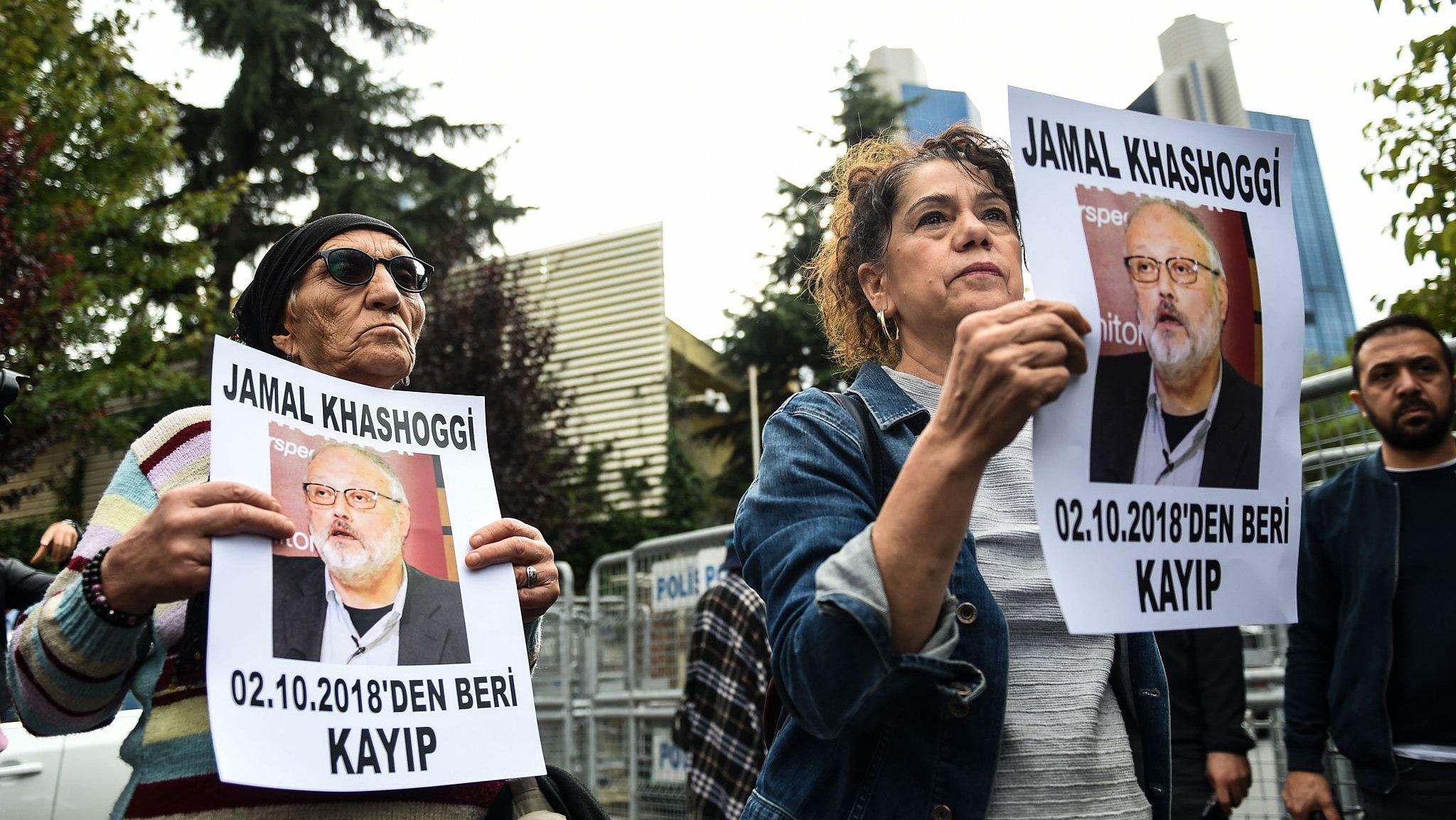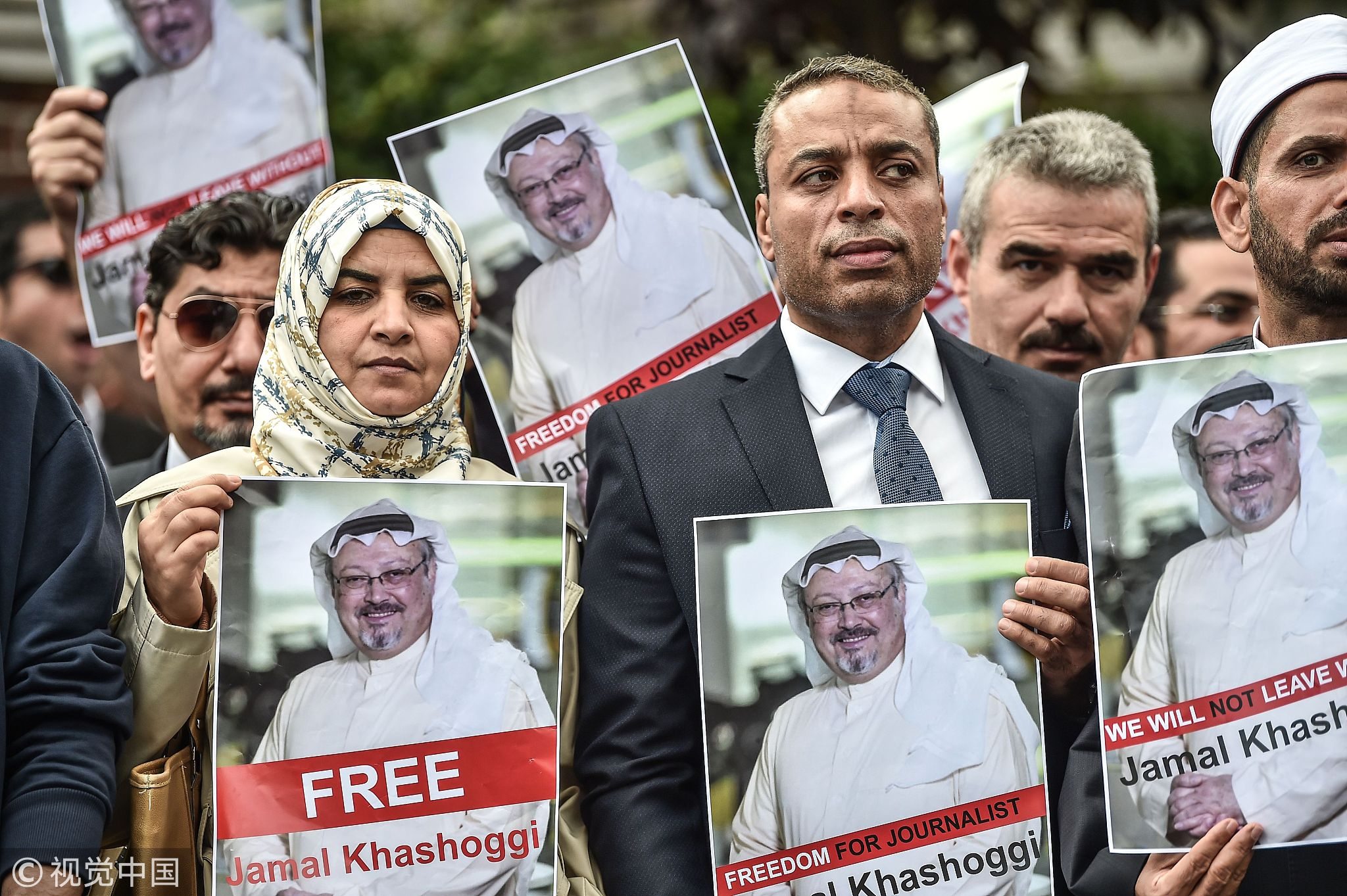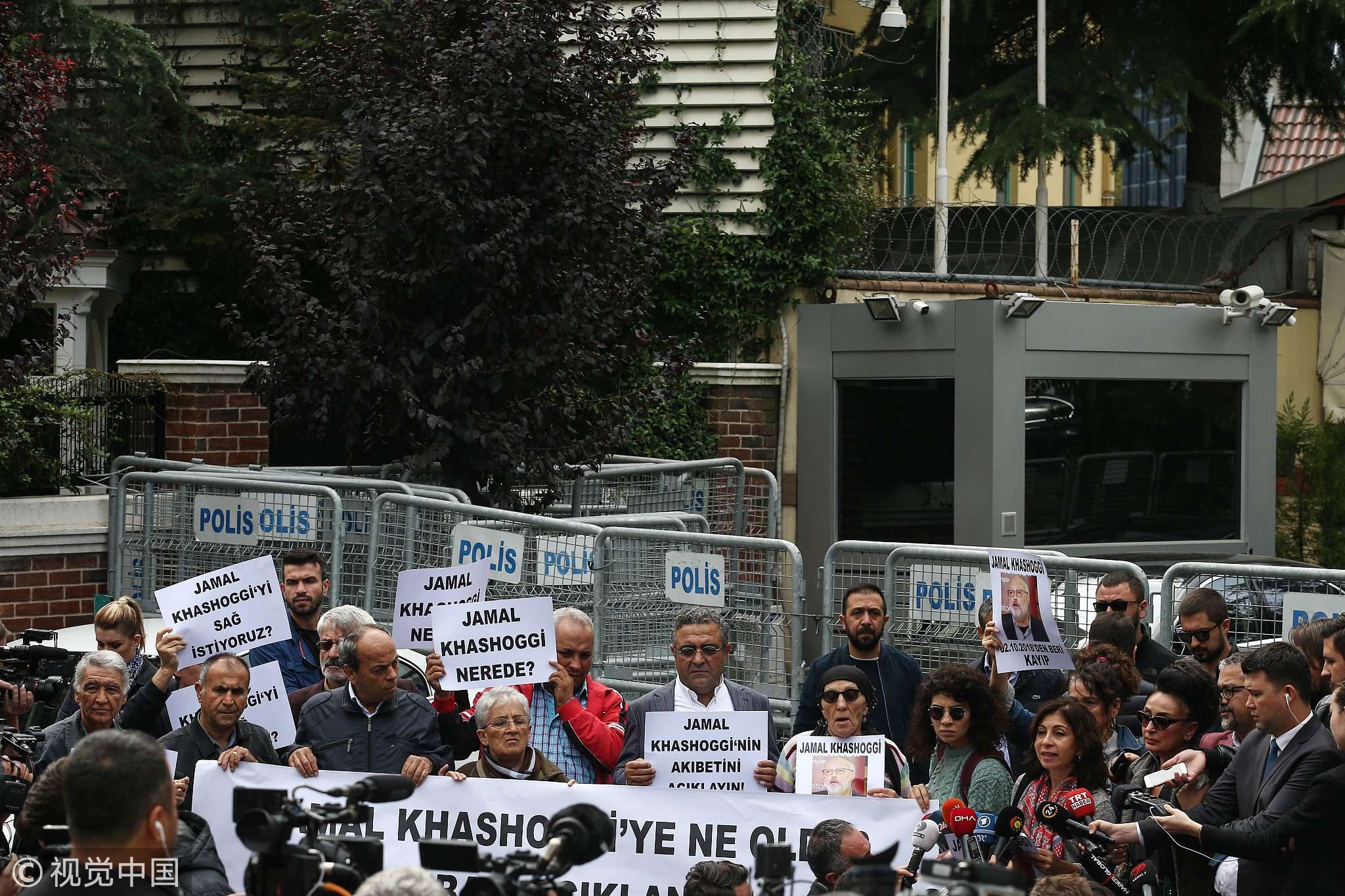
Opinions
22:22, 12-Oct-2018
Opinions: Khashoggi’s disappearance underlines Turkey-Saudi tensions
Updated
21:39, 15-Oct-2018
Wang Jin

Editor's note: Wang Jin is a research fellow at the Charhar Institute and Syria Research Center of Northwest University in China. The article reflects the author's opinion, and not necessarily the views of CGTN.
The disappearance of Saudi columnist Jamal Khashoggi in the Saudi consulate of Istanbul, Turkey, has become a sensitive issue. Turkey's security establishment has revealed both video and audio to prove that Khashoggi disappeared in the Saudi consulate; however, Saudi Arabia insists its innocence over his disappearance.
The harsh allegations over Khashoggi's disappearance have provoked the tensions between Ankara and Riyadh, and become representative of the strained Turkey-Saudi Arabia relations.

Protesters hold pictures of missing journalist Jamal Khashoggi during a demonstration in front of the Saudi Arabian consulate in Istanbul, Turkey, on October 8, 2018. /VCG Photo
Protesters hold pictures of missing journalist Jamal Khashoggi during a demonstration in front of the Saudi Arabian consulate in Istanbul, Turkey, on October 8, 2018. /VCG Photo
Although both Turkey and Saudi Arabia are Sunni-dominated states in the Middle East, the relations between Ankara and Riyadh have been challenged by various obstacles, the first of which is an ideological division.
Saudi Arabia is the center of Wahhabi Islam, which has expanded throughout the world over the past decades, while Turkey under the Justice and Development Party led by President Recep Tayyip Erdogan is one of the major supporters of the Muslim Brotherhood – an international Islamic network that is at odds with Wahhabism.
Saudi Arabia perceives itself as the natural leader of the Arab and Islamic world given its status as "guardian of the two holy cities," Mecca and Medina, while Turkey upholds the "neo-Ottomanism" principle with the ambition of expanding its influence in the Middle East.
Second, Turkey and Saudi Arabia disagree with each other in many sensitive regional and international issues. In the Israel-Palestine issue, Turkey supports the Islamic Resistance Movement, or Hamas, which enjoys close relations with the Muslim Brotherhood, while Saudi Arabia supports the Palestinian Authority in the West Bank.
After Saudi Arabia, the UAE and other Arab states isolated Qatar in June 2017, Ankara became a steadfast supporter of Doha and Turkey's support helped significantly decreased Qatar's foreign pressure. The most sensitive issue between Ankara and Riyadh comes from their different attitudes toward Washington's sanctions against Iran.
Although Saudi Arabia repeatedly highlights the “threat of Iran” in the Middle East, it is not likely for Turkey to cut its relations with Tehran. Iran is a major energy supporter and eliminating energy cooperation with Tehran would seriously threaten its energy supply.
Third, the personal relationship between Erdogan and Saudi Crown Prince Mohammed bin Salman has not gone well. The young Saudi Crown Prince adopted several reforms at home, from concentrating political power to providing more social freedom to Saudi females. Bin Salman hopes to limit Islamic extremism at home and advocates “moderate Islam” in the Islamic world.
However, for Erdogan, bin Salman's reforms were interpreted as “dividing the Islamic world.” Meanwhile, Saudi Arabia's military intervention into Yemen's civil war is also viewed by Erdogan as the major cause of humanitarian disaster for Yemenis. Bin Salman's close relationship with Jared Kushner, the son-in-law of US President Donald Trump, is also perceived by Erdogan as a betrayal of Palestinians.

Members of the Human Rights Association's Istanbul branch office demonstrate in front of the Consulate General of Saudi Arabia in Istanbul, Turkey, on October 9, 2018. /VCG Photo
Members of the Human Rights Association's Istanbul branch office demonstrate in front of the Consulate General of Saudi Arabia in Istanbul, Turkey, on October 9, 2018. /VCG Photo
Therefore, Khashoggi's disappearance has added to the tension between Ankara and Riyadh. However, the case will not, if handled properly, threaten the foundation of bilateral ties between the two countries. For Turkey, the most imminent issue comes from its role in Syria. Ankara has been trying to establish a “buffer zone” in northern Syria, especially in Idlib and northern Aleppo provinces, to both eliminate the “Kurdish terrorists” in northern Syria and to settle more than 3 million Syrian refugees in Turkey.
Ankara's strategy over northern Syria faces strong opposition from the Syrian government and Iran, and it is necessary for Turkey to gain support from Saudi Arabia. Meanwhile, Turkey has suffered significant economic losses after Washington's economic sanctions came into effective last month. As an important, rich power in the Gulf, Saudi Arabia could be a reliable investment partner for Turkey.

A still image taken from CCTV video and obtained by TRT World claims to show Saudi journalist Jamal Khashoggi as he arrives at the Saudi consulate in Istanbul, Turkey, October. 2, 2018. /VCG Photo
A still image taken from CCTV video and obtained by TRT World claims to show Saudi journalist Jamal Khashoggi as he arrives at the Saudi consulate in Istanbul, Turkey, October. 2, 2018. /VCG Photo
Although Khashoggi's disappearance has provoked the tension between Ankara and Riyadh, the bilateral ties between Turkey and Saudi Arabia might not be fundamentally threatened.
(If you want to contribute and have specific expertise, please contact us at opinions@cgtn.com.)

SITEMAP
Copyright © 2018 CGTN. Beijing ICP prepared NO.16065310-3
Copyright © 2018 CGTN. Beijing ICP prepared NO.16065310-3